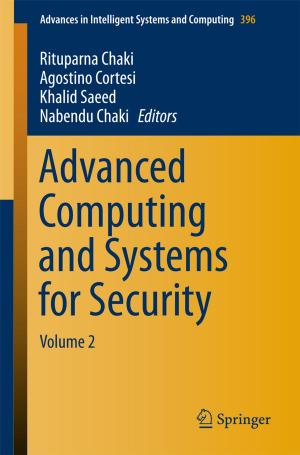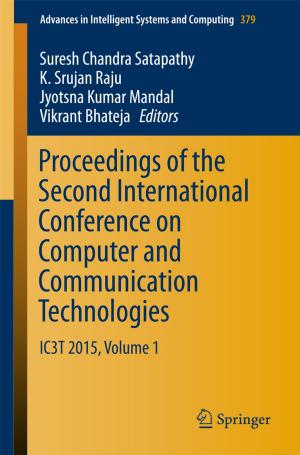Channel Coding Techniques for Wireless Communications
Nonfiction, Science & Nature, Mathematics, Applied, Computers, Advanced Computing, Computer Science| Author: | K. Deergha Rao | ISBN: | 9788132222927 |
| Publisher: | Springer India | Publication: | March 26, 2015 |
| Imprint: | Springer | Language: | English |
| Author: | K. Deergha Rao |
| ISBN: | 9788132222927 |
| Publisher: | Springer India |
| Publication: | March 26, 2015 |
| Imprint: | Springer |
| Language: | English |
The book discusses modern channel coding techniques for wireless communications such as turbo codes, low parity check codes (LDPC), space-time coding, Reed Solomon (RS) codes and convolutional codes. Many illustrative examples are included in each chapter for easy understanding of the coding techniques. The text is integrated with MATLAB-based programs to enhance the understanding of the subject’s underlying theories. It includes current topics of increasing importance such as turbo codes, LDPC codes, LT codes, Raptor codes and space-time coding in detail, in addition to the traditional codes such as cyclic codes, BCH and RS codes and convolutional codes. MIMO communications is a multiple antenna technology, which is an effective method for high-speed or high-reliability wireless communications. PC-based MATLAB m-files for the illustrative examples are included and also provided on the accompanying CD, which will help students and researchers involved in advanced and current concepts in coding theory. Channel coding, the core of digital communication and data storage, has undergone a major revolution as a result of the rapid growth of mobile and wireless communications.
The book is divided into 11 chapters. Assuming no prior knowledge in the field of channel coding, the opening chapters (1 - 2) begin with basic theory and discuss how to improve the performance of wireless communication channels using channel coding. Chapters 3 and 4 introduce Galois fields and present detailed coverage of BCH codes and Reed-Solomon codes. Chapters 5–7 introduce the family of convolutional codes, hard and soft-decision Viterbi algorithms, turbo codes, BCJR algorithm for turbo decoding and studies trellis coded modulation (TCM), turbo trellis coded modulation (TTCM), bit-interleaved coded modulation (BICM) as well as iterative BICM (BICM-ID) and compares them under various channel conditions. Chapters 8 and 9 focus on low-density parity-check (LDPC) codes, LT codes and Raptor codes. Chapters 10 and 11 discuss MIMO systems and space-time (ST) coding.
The book discusses modern channel coding techniques for wireless communications such as turbo codes, low parity check codes (LDPC), space-time coding, Reed Solomon (RS) codes and convolutional codes. Many illustrative examples are included in each chapter for easy understanding of the coding techniques. The text is integrated with MATLAB-based programs to enhance the understanding of the subject’s underlying theories. It includes current topics of increasing importance such as turbo codes, LDPC codes, LT codes, Raptor codes and space-time coding in detail, in addition to the traditional codes such as cyclic codes, BCH and RS codes and convolutional codes. MIMO communications is a multiple antenna technology, which is an effective method for high-speed or high-reliability wireless communications. PC-based MATLAB m-files for the illustrative examples are included and also provided on the accompanying CD, which will help students and researchers involved in advanced and current concepts in coding theory. Channel coding, the core of digital communication and data storage, has undergone a major revolution as a result of the rapid growth of mobile and wireless communications.
The book is divided into 11 chapters. Assuming no prior knowledge in the field of channel coding, the opening chapters (1 - 2) begin with basic theory and discuss how to improve the performance of wireless communication channels using channel coding. Chapters 3 and 4 introduce Galois fields and present detailed coverage of BCH codes and Reed-Solomon codes. Chapters 5–7 introduce the family of convolutional codes, hard and soft-decision Viterbi algorithms, turbo codes, BCJR algorithm for turbo decoding and studies trellis coded modulation (TCM), turbo trellis coded modulation (TTCM), bit-interleaved coded modulation (BICM) as well as iterative BICM (BICM-ID) and compares them under various channel conditions. Chapters 8 and 9 focus on low-density parity-check (LDPC) codes, LT codes and Raptor codes. Chapters 10 and 11 discuss MIMO systems and space-time (ST) coding.















